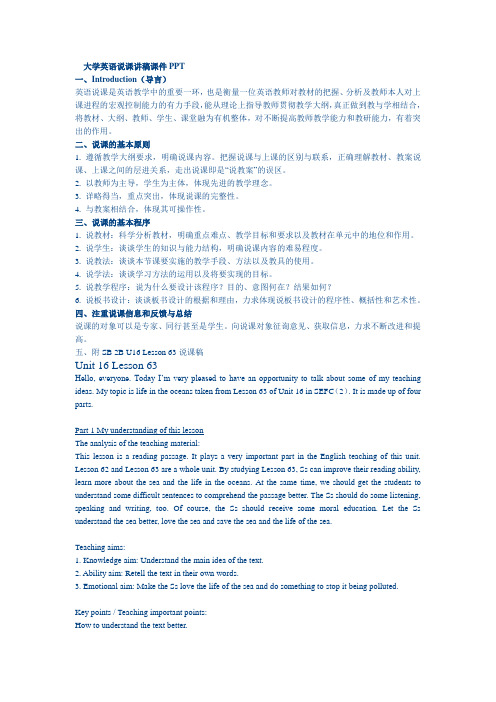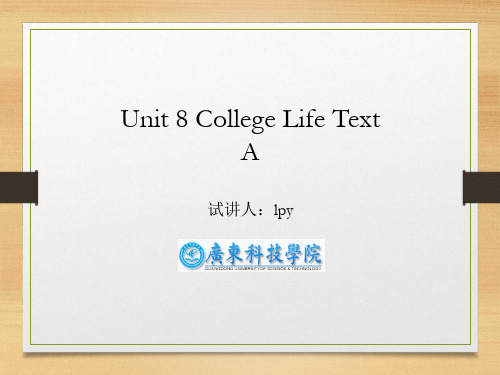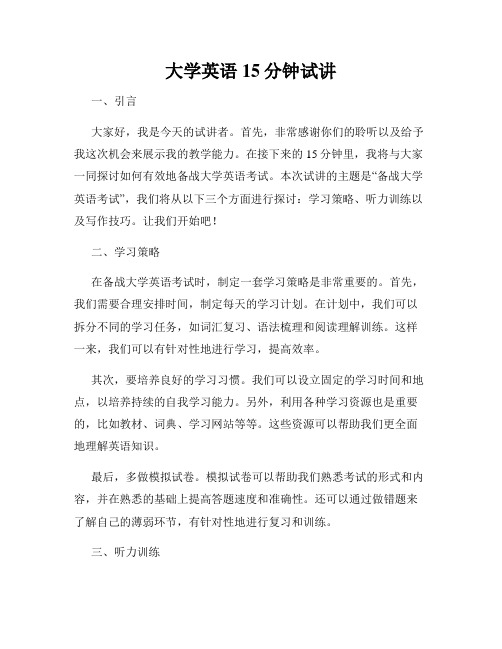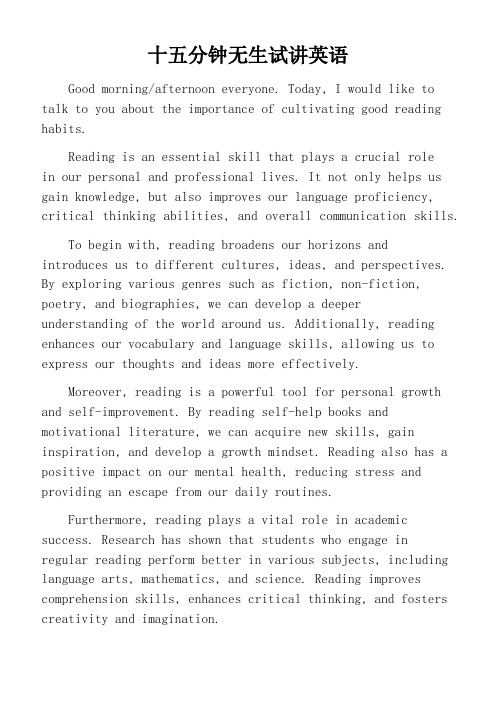大学英语15分钟试讲(课堂PPT)
大学英语试讲ppt课件

Teaching Contents Warming-up questions
(1) Did you admire Bill Gates ? Why?
Key tips: talented, rich and successful
6
Teaching Contents
• (2)Success and wealth, if you could only keep one, what would be your choice
2
Teaching Objectives
Understand the main idea and the structure of the text, and cultivate their independent learning ability Grasp the key language points and the grammatical structures in the text Conduct a series of reading, listening, speaking, writing, and translation activities related to the theme of this unit.
3
important points
Difficult points
Language points Words study: Grammar:
The difficult point is to know how to divide the whole article into parts and get the main idea of the text
选 外Uo语自rn教:liotv学《e3与新?:研视w究野e出英al版语th社教, 程su1c》cess
大学英语试讲精ppt课件

2
Word Study
3
Text Analysis
4
Text Understanding
5
Summary of the Text
6
Exercises
.
Before Reading
Global Reading
Detailed Reading After Reading
Unit 1 Some Strategies for Learning English
Section 1 :True or False
1. Language learners should memorize all the new words.
( F)
2. It’s impossible to cram too many words into your head
at a time. ( T )
1
Before Reading
2
Global Reading
3
Detailed Reading
4
After Reading
.
Part Two: Global Text Understanding
Section 1 : True or False Section 2: Division of the Text
• To improve students ’ability in oral presentation and demonstration.
.
Teaching Objectives
• 1. Learning key words and structures • 2. Talking about different cultures • 3. Reading skill: finding out the main ideas in
大学英语15分钟试讲[优质ppt]
![大学英语15分钟试讲[优质ppt]](https://img.taocdn.com/s3/m/9c05d77bdd36a32d72758111.png)
Part Two: Global Text Understanding
True or False
1. Language learners should memorize all the new words.
4. Listening to English is good both to our sense of
hearing and to our speaking. ( F )
5. Language learners do not find many opportunities to
practice oral English at school. ( T )
• A topic sentence expresses the central idea, and close connection between the sentences, the sentences serves to back up the central idea.
• Paragraph= one topic sentence + supporting sentence + (A summary or Conclusion)
CollegeEnglish
Teacher:ZhaoXX ContactNumber:XXXXXXXXX
Teaching Aims
• Understand the text and reading for the main idea in a paragraph
• To grasp some keys words, phrases and useful sentence patterns
大学英语教师试讲课件

Reading & Text Comprehension
Principle 9: (in para.6)
Studying together
Indication word: The value of studying together was in …
Principle 10: (in para.6)
Test yourself (conduct hypothetical tests)
Indication word: The experiment also illuminated the value of…
Reading & Text Comprehension
Schedule their time
Indication word: It is also important
Principle 6: (in para.4)
Take good notes and use them
Indication word: a secret of their success
Vocabulary & Useful Expressions
Innate ['ɪneit]
An innate quality or ability is one which a person is born with
Eg: All human beings have an innate desire to overcome sufferings, to find happiness. He obviously has an innate talent for music. =He is a born musician. 天生的 Innate immunity 先天免疫
大学英语说课讲稿课件PPT

大学英语说课讲稿课件PPT一、Introduction(导言)英语说课是英语教学中的重要一环,也是衡量一位英语教师对教材的把握、分析及教师本人对上课进程的宏观控制能力的有力手段,能从理论上指导教师贯彻教学大纲,真正做到教与学相结合,将教材、大纲、教师、学生、课堂融为有机整体,对不断提高教师教学能力和教研能力,有着突出的作用。
二、说课的基本原则1. 遵循教学大纲要求,明确说课内容。
把握说课与上课的区别与联系,正确理解教材、教案说课、上课之间的层进关系,走出说课即是“说教案”的误区。
2. 以教师为主导,学生为主体,体现先进的教学理念。
3. 详略得当,重点突出,体现说课的完整性。
4. 与教案相结合,体现其可操作性。
三、说课的基本程序1. 说教材:科学分析教材,明确重点难点、教学目标和要求以及教材在单元中的地位和作用。
2. 说学生:谈谈学生的知识与能力结构,明确说课内容的难易程度。
3. 说教法:谈谈本节课要实施的教学手段、方法以及教具的使用。
4. 说学法:谈谈学习方法的运用以及将要实现的目标。
5. 说教学程序:说为什么要设计该程序?目的、意图何在?结果如何?6. 说板书设计:谈谈板书设计的根据和理由,力求体现说板书设计的程序性、概括性和艺术性。
四、注重说课信息和反馈与总结说课的对象可以是专家、同行甚至是学生。
向说课对象征询意见、获取信息,力求不断改进和提高。
五、附SB 2B U16 Lesson 63说课稿Unit 16 Lesson 63Hello, everyone. Today I’m very pleased to hav e an opportunity to talk about some of my teaching ideas. My topic is life in the oceans taken from Lesson 63 of Unit 16 in SEFC(2). It is made up of four parts.Part 1 My understanding of this lessonThe analysis of the teaching material:This lesson is a reading passage. It plays a very important part in the English teaching of this unit. Lesson 62 and Lesson 63 are a whole unit. By studying Lesson 63, Ss can improve their reading ability, learn more about the sea and the life in the oceans. At the same time, we should get the students to understand some difficult sentences to comprehend the passage better. The Ss should do some listening, speaking and writing, too. Of course, the Ss should receive some moral education. Let the Ss understand the sea better, love the sea and save the sea and the life of the sea.Teaching aims:1. Knowledge aim: Understand the main idea of the text.2. Ability aim: Retell the text in their own words.3. Emotional aim: Make the Ss love the life of the sea and do something to stop it being polluted.Key points / Teaching important points:How to understand the text better.Teaching difficult points:1. Use your own words to retell the text.2. Discuss the pollution of the sea and how to save the sea.Something about the Ss:1. The Ss have known something about the sea and sea life through the Internet and other ways.2. They are lack of vocabulary.3. They don’t often use English to express themselves and communicate with others.4. Some Ss are not active in the class because they are afraid of making mistakes.Part 2 My teaching theories, methods and aidsBefore dealing with this lesson, I’ll do my best to carry out the following theories: Make the Ss the real masters in class while the teacher himself acts as director;Combine the language structures with the language functions; Let the students receive some moral education while they are learning the English language.Teaching method:Double activities teaching methodQuestion-and-answer activity teaching methodWatch-and-listen activityFree discussion methodPair work or individual work methodTeaching aids:1. a projector2. a tape recorder3. multimedia4. the blackboardPart 3. Teaching steps / proceduresI have designed the following steps to train their ability of listening, speaking, reading and writing, especially reading ability.The entire steps are:Greetings, Revision, Lead-in and preparation for reading, Fast reading(scanning), Listening, Intensive reading, Preparation for details of the text, Consolidation, Discussion, HomeworkStep 1 GreetingsGreet the whole class as usual.Step 2. Revision1. Ask students some questions to revise the last lesson(show them on the screen).a. How much salt do the oceans contain per thousand parts of water?(35 parts of salt. 3.5% by weight)b. What is coral? Why are corals not found in deep water?c. Why is the Dead Sea called the Dead Sea?2. Check the homework(made a survey about the sea or sea life by surfing the Internet or asking for help from other people). Through this part we can consolidate what they studied yesterday, communicate with others about their survery results and prepare for the new lesson.Step 3. Lead-in and preparation for readingShow them some pictures and let them talk each other, and then use the pictures about sea and life in the oceans to learn new words, for example, Antarctica, huge whale, sperm whale, squid and so on. Purpose: Arouse the students’ intere st of study.Bring in new subject: Life in the oceans.Step 4. Fast readingRead the passage as quickly as they can. I show the questions on the screen and let them get the main idea of each paragraph:1. Why can living things live in such oceans around the Antarctica?2. What does the whale feed on?3. What is the difference between the sperm whale and other whales?Method: Read the text individually, use question—and—answer activity.Purpose: Improve the students’ reading ability.Understand the general idea of each paragraph.Step 5. Listening(book closed)1. Listen to the tape then do an exercise(wb page 90, part 1)2. True or false exercise.(on the screen)Train the Ss’ listening ability and prepare for later exercises.Step 6. Intensive readingRead the passage carefully again and answer some detailed questions on the screen.1. How much does a whale eat at a time?2. Do all the whales feed on small fish?3. How deep can a sperm whale dive?It is also called depth reading or study reading. It means reading for detailed information.Purpose: Further understand the text (Train further reading ability)to find out some different sentences and details of the text.Step 7. Preparation for details of the text on the screen1. ...its heart slows to half its normal speed.slow-v. to become / make slower.2. ing sound wavePresent participle used as adverbial.3. provide sth. for sb.provide sb. with sth.4. at a time: each time5. grow to a length of...Purpose: Train the Ss’ ability of understanding and using laguage.Step 8. Consolidation1. Find out the topic sentences.2. Retell the passage according to the topic sentences.Purpose: I want to know if my students understand the whole text really and if they master what I mean to tell them in this class. What’s more, I want to let them have the ability of introducing and analyzing expression. At the same time, I will write down the topic sentences on the blackboard according to what the students find, so they can retell it easily.Step 9. DiscussionShow them some pictures about the polluted sea and many living things which are in danger and ask them: What are their opinions about it? In order to let them have free choice, I give them another topic: The sea is being polluted. What should they do?Purpose: I mean to give them emotional education. I give them multi-media pictures to arouse their interest of study and their love for life. I mean to make them realize: The sea is in danger!I teach them to do their best to help it and do something from now on. Everyone should do something to love and protect our home.Step 10. HomeworkWrite an article Saving the sea. I want to improve the ability of their writing. At the same time, train the ability of do-it-yourself and looking up the information by themseleves.Part 4. Blackboard designUnit 16 Lesson 63Topic Sentences:1. Some living things can live in Antarctica.(what)2. The whale feeds on small fish.(what)3. The sperm whale feeds on squid.(difference)Discussion:1. The whales are in danger. What’s your opinion about it?2. The sea is being polluted. What should we do?In my opinion, the blackboard design can reflect the teacher’s ability of mastering the text and leading the students to master the text easily.In this text, the design is not easy to write. I write the topic sentences on the blackboard in order to tell the students that this is of the importance in this class. The discussion is of the difficulty.I want to make the design inductive, instructive and artistic.。
大学英语教师试讲 ppt课件

Reading & Text Comprehension
Text A: Secrets of Straight-A
Students
Taken from Improve Your English Through Comprehension Practice by Christina Lim Cher
Para. 1: Introduction
A professor of education says: It is far more important for a student to know:
How to make the most of his or her innate abilities.
Principle 8: (in para.5)
speak up and ask questions in class
Indication word: It is equally important
Reading & Text Comprehension
Principle 9: (in para.6)
Reading & Text Comprehension
Principle 5: (in para.4)
Sche word: It is also important
Principle 6: (in para.4)
Take good notes and use them
Reading & Text Comprehension
Principle 3: (in para.3)
Get organized
Indication word: also
Principle 4: (in para.3)
大学英语15分钟试讲

Teaching Objectives
• 1. Learning key words and structures • 2. Talking about different cultures • 3. Reading skill: finding out the main ideas in
Topic sentence
Part Three : Detail Reading
1. Do not treat all new words in exactly the same way. Have you ever complained about your memory because you find it simply impossible to memorize all the new words you are learning? But, in fact, it is not your memory that is at fault. If you cram your head with too many new words at a time, some of them are bound to be crowded out. What you need to do is to deal with new words in different ways according to how frequently they occur in everyday use. While active words demand constant practice and useful words must be committed to memory, words that do not often occur in everyday situations require just a nodding acquaintance. You will find concentrating on active and useful words the most effective route to enlarging your vocabulary.
大学英语 分钟试讲PPT

• Paragraph= one topic sentence + supporting sentence + (A summary or Conclusion)
College English
Teacher:Zhao XX Contact Number:XXXXXXXXX
Teaching Aims
• Understand the text and reading for the main idea in a paragraph
• To grasp some keys words, phrases and useful sentence patterns
• To improve students ’ability in oral presentation and demonstration.
Teaching Objectives
• 1. Learning key words and structures • 2. Talking about different cultures • 3. Reading skill: finding out the main ideas in
Topic sentence
Part Three : Detail Reading
1. Do not treat all new words in exactly the same way. Have you ever complained about your memory because you find it simply impossible to memorize all the new words you are learning? But, in fact, it is not your memory that is at fault. If you cram your head with too many new words at a time, some of them are bound to be crowded out. What you need to do is to deal with new words in different ways according to how frequently they occur in everyday use. While active words demand constant practice and useful words must be committed to memory, words that do not often occur in everyday situations require just a nodding acquaintance. You will find concentrating on active and useful words the most effective route to enlarging your vocabulary.
大学英语15分钟试讲

大学英语15分钟试讲一、引言大家好,我是今天的试讲者。
首先,非常感谢你们的聆听以及给予我这次机会来展示我的教学能力。
在接下来的15分钟里,我将与大家一同探讨如何有效地备战大学英语考试。
本次试讲的主题是“备战大学英语考试”,我们将从以下三个方面进行探讨:学习策略、听力训练以及写作技巧。
让我们开始吧!二、学习策略在备战大学英语考试时,制定一套学习策略是非常重要的。
首先,我们需要合理安排时间,制定每天的学习计划。
在计划中,我们可以拆分不同的学习任务,如词汇复习、语法梳理和阅读理解训练。
这样一来,我们可以有针对性地进行学习,提高效率。
其次,要培养良好的学习习惯。
我们可以设立固定的学习时间和地点,以培养持续的自我学习能力。
另外,利用各种学习资源也是重要的,比如教材、词典、学习网站等等。
这些资源可以帮助我们更全面地理解英语知识。
最后,多做模拟试卷。
模拟试卷可以帮助我们熟悉考试的形式和内容,并在熟悉的基础上提高答题速度和准确性。
还可以通过做错题来了解自己的薄弱环节,有针对性地进行复习和训练。
三、听力训练在备战大学英语考试中,听力部分占据了很大的比重。
所以,我们需要进行系统的听力训练,提高自己的听力水平。
首先,我们可以利用听力材料进行听力练习。
这些材料可以来自于教材、网络资源或者专门的听力训练软件。
我们可以分别进行听力测试、听力填空和听力理解等不同类型的练习,以提高我们的听力技巧和应对能力。
其次,利用英语电影、纪录片等真实语境下的听力材料进行训练。
这样可以更好地锻炼我们的听力能力,同时也增加了对英语语境的理解。
在听的过程中,我们可以注意语音、语调、重音等语言细节,并进行模仿和跟读,以提高自己的听力技巧。
最后,做听力笔记是很重要的。
通过做笔记,我们可以更好地理解听力内容,并将其与写作和口语能力相结合。
在笔记中可以记录关键词、主要观点和难点等信息,以便后续的复习和巩固。
四、写作技巧在备战大学英语考试中,写作部分同样需要我们的重点关注。
十五分钟无生试讲英语

十五分钟无生试讲英语Good morning/afternoon everyone. Today, I would like to talk to you about the importance of cultivating good reading habits.Reading is an essential skill that plays a crucial rolein our personal and professional lives. It not only helps us gain knowledge, but also improves our language proficiency, critical thinking abilities, and overall communication skills.To begin with, reading broadens our horizons and introduces us to different cultures, ideas, and perspectives. By exploring various genres such as fiction, non-fiction, poetry, and biographies, we can develop a deeper understanding of the world around us. Additionally, reading enhances our vocabulary and language skills, allowing us to express our thoughts and ideas more effectively.Moreover, reading is a powerful tool for personal growth and self-improvement. By reading self-help books and motivational literature, we can acquire new skills, gain inspiration, and develop a growth mindset. Reading also has a positive impact on our mental health, reducing stress and providing an escape from our daily routines.Furthermore, reading plays a vital role in academic success. Research has shown that students who engage in regular reading perform better in various subjects, including language arts, mathematics, and science. Reading improves comprehension skills, enhances critical thinking, and fosters creativity and imagination.In addition to its educational benefits, reading also has social advantages. It allows us to connect with others who share similar interests and can spark meaningful conversations. Book clubs and reading groups provide platforms for exchanging ideas and opinions, fostering a sense of community and belonging.Despite the numerous benefits of reading, many peoplefind it challenging to incorporate it into their daily routines. To develop good reading habits, it is important to start small and gradually increase the reading time. Setting aside a dedicated reading space, free from distractions, can also help create a conducive environment. Additionally, finding books that align with one's interests and preferences can make reading more enjoyable and engaging.In conclusion, reading is an invaluable skill that enriches our lives in countless ways. By cultivating good reading habits, we can expand our knowledge, improve our language proficiency, and enhance our overall communication skills. So, let's take fifteen minutes each day to delve into the wonderful world of books and reap the benefits that reading has to offer. Thank you.。
英语十五分钟试讲

Good afternoon, my boys and girls. Welcome back to my class from the summer holiday. I am so glad to see you again. Have you had a good holiday? Yeah! Then what did you do during the summer holiday? Sleep, watch TV, travel with parents. I see. All of you had a wonderful holiday. Well, today I will introduce a new friend to you, let’s share what she did during the holiday. Now, listen to the tape carefully, then I’ll ask you some questions. Hey, I’m your new friend Tiffany! Last Sunday, I went to the park with my friends for a picnic. We took several bread and some bottles of water with us for lunch. Of course we didn't forget to take some fruits and we even took some tomatoes and cucumbers. It took us thirty minutes to get there by bike. As it was a sunny day, there were lots of people in the park. Firstly, we climbed the mountain and went boating. Then it was the time for lunch, we took out the food and began to prepare our lunch. Though it was not cooked well, we ate happily. When we finished the picnic, we picked up the rubbish and threw it into the dustbin. We thought it was our duty to keep the good environment. We didn’t go home until it was dark. We all enjoyed ourselves.Ok, do you understand the story?Yeah! Well, I will ask some you some questions.1. Why did Tiffany and her friends go to the park? Go for a picnic.2 What did they take to the park?Who want to try? oh, Lily.bread, bottles of water , fruits, tomatoes, cucumbers. Very good3 How long did it take them to go there? 30 minutes4 what did they do after the picnic? Can you find the answer? When we finished the picnic, we picked up the rubbish and threw it into the dustbin. Now, you have understood the story well. Let’s look at the details of the text.一phases let’s look at the phrases in the text.1Go for a picnic. have food outdoors2 By bike it’s an important phrase. by加transport is the meaning of taking transport. For example by bike/train/bus/ship/airplane/foot ,no, it is on foot, not by foot.3 pick up take sth up I picked up the money on the ground. Ok so much for the phrases.二important sentences1.It took us thirty minutes to get there by bike.The sentence instruction is :It takes/took sb some time to do sth.And the question sentence of this instruction is : how long does/did it take sb to sth.for example: H ow long does it take you to go home?It usually takes me 20minutes to go home.Who can make a sentence?Don’t be shy, just have a try. Ok, lucy and xiaoming. How long does it take you to go to school? It takes me half an hour to go to school. Great, sit down please.The next sentence is :we didn’t go until it was dark. The sentence instruction is :not until .what’s the meaning of the phrase?直到...才。
15+一分钟+课件

03
CATALOGUE
知识点一:基础概念
定义与概念
定义
云计算是一种将计算资源和服务通过互联网 提供给客户的模式,它实现了按需自助、网 络访问、快速弹性和服务计量等特点。
概念
云计算是一种基于虚拟化技术的服务模式, 它将计算资源(如服务器、存储设备和网络 设备)进行虚拟化,形成云,从而使得客户 可以通过互联网获取这些资源和服务。
01
总结今天学习的内容,强调重点 和难点,以及自己的理解和感悟 。
02
可以使用简单的图表或示意图来 帮助自己更好地理解和记忆。
提问与答疑
针对今天学习的内容,提出自己的疑 问或困惑。
可以向老师或同学寻求帮助,共同探 讨解决问题的方法。
研究领域:主要应用于社会心理学领域,探讨个体如何对行为结果进行 归因,以及这种归因如何影响个体的情感和行为。
重要理论
情感调节理论
定义:情感调节是指个体对自身情感状态进行管理和控制的过程。
研究领域:主要应用于情感心理学领域,探讨个体如何通过认知和行为来调节自身的情感状 态。
理论应用
教育领域的应用
教师可以通过运用心理学理论, 更好地理解学生的学习方式和需 求,从而设计更有效的教学策略 。
课程目标学习者将学会如何利用现有的工具和资源,在短时 间内制作出具有吸引力和实用性的课件,从而更好地展示自 己的思想和观点,提高学习和工作的效率。
学习方法
学习方法:本课程采用视频教程和图 文教程相结合的方式,帮助学习者更 好地掌握制作课件的技巧和方法。
VS
学习方法学习者可以通过观看视频教 程,了解制作课件的具体步骤和技巧 ;同时,通过图文教程的学习,可以 更好地理解制作课件的思路和原理。 此外,课程还提供了实践练习的机会 ,让学习者在实际操作中更好地掌握 制作课件的技巧和方法应用于各种领域,如金融、医 疗、教育、政府和企业等。在这些领域中, 客户可以通过云计算获得计算资源和服务, 从而提高工作效率和降低成本。
- 1、下载文档前请自行甄别文档内容的完整性,平台不提供额外的编辑、内容补充、找答案等附加服务。
- 2、"仅部分预览"的文档,不可在线预览部分如存在完整性等问题,可反馈申请退款(可完整预览的文档不适用该条件!)。
- 3、如文档侵犯您的权益,请联系客服反馈,我们会尽快为您处理(人工客服工作时间:9:00-18:30)。
people commit crimes. 研究旨在找出人们犯罪的原因
b. say that sb. will definitely do sth. or must do sth.
the attitude we should hold to words that do not
often occur in everyday situations.
16
Sentence study
Paraphrase the sentence:
We should often practice the use of active words, Those which frequently occur in everyday use, and learn by heart those useful words, while we only need recognize those words which occur less frequently in everyday situations.
I am afraid I have only a nodding acquaintances with him.
我和他只是点头之交。
This phrase is used as a metaphor.
This interpersonal relationship is used to interpret
Warm-up Questions Global Text Understanding Detail Reading Following-up Discussion Assignment Feedback
4
Before Reading
Global Reading
Detailed Reading After Reading
9
Work with your partner, and discuss the question: How do you treat new words in your own reading?
10
Words and Expressions
memorize, memory n记忆... realize v. 实现;organize v. memorize: vt. Learn (sth) so that you remember it
True or False
1. Language learners should memorize all the new words.
( F)
2. It’s impossible to cram too many words into your head
at a time. ( T )
3. Listening to English occasionally will improve your ear
11
Words and Expressions
The boy can据。
An actor must be able to memorize his lines. 演员须善于熟记台词。
Our English teacher asked us to memorize the words we learned today.
perfectly suffix:a letter or a group of letters added to the end of a
word. For example, the suffix ‘–ness’ is add to “great” and “happy” to make “greatness” and happiness 后缀 suf. 1. –ize: bring sth into being,表示“使成为;使 形成;使……化”之意。Globalize, idealize(理想化)
• To improve students ’ability in oral presentation and demonstration.
2
Teaching Objectives
• 1. Learning key words and structures • 2. Talking about different cultures • 3. Reading skill: finding out the main ideas in
paragraphs • 4. Writing skill: writing a paragraph of a general
statement supported by specific details and reasons
3
Part One: Part Two: Part Three : Part Four : Part Five : Part Six :
17
Sentence study
• Analyze the structure of the sentence. While is used as a conjunction, meaning “although” or “even though” I like tea while she likes coffee.
practice oral English at school. ( T )
7
Section 1 Topic sentence
• A topic sentence must be a complete sentence, not a fragment.
• A topic sentence is usually a clear and direct statement, not a question.
College English
Teacher:Zhao XX Contact Number:XXXXXXXXX
1
Teaching Aims
• Understand the text and reading for the main idea in a paragraph
• To grasp some keys words, phrases and useful sentence patterns
think is the most effective way of learning English ? 2. Do you have any trouble in learning English? If any, what is it?
6
Part Two: Global Text Understanding
e.g. He didn’t commit himself to anything. 他没有作任何承诺。
Commit to memory :learn (sth.) so that you remember it
15
Words and Expressions
a nodding acquaintance:
8
Topic sentence
Part Three : Detail Reading
1. Do not treat all new words in exactly the same way. Have you ever complained about your memory because you find it simply impossible to memorize all the new words you are learning? But, in fact, it is not your memory that is at fault. If you cram your head with too many new words at a time, some of them are bound to be crowded out. What you need to do is to deal with new words in different ways according to how frequently they occur in everyday use. While active words demand constant practice and useful words must be committed to memory, words that do not often occur in everyday situations require just a nodding acquaintance. You will find concentrating on active and useful words the most effective route to enlarging your vocabulary.
• A nodding acquaintance is a slight knowledge of a person or a subject.
I have a nodding acquaintance with French, but I do not know it well.
我稍懂些法语, 但并不精通。
Unit 1 Some Strategies for Learning English
1
Before Reading
2
Global Reading
3
Detailed Reading
4
After Reading
5
Part One: Warm-up Questions 1. How do you study English? What do you
